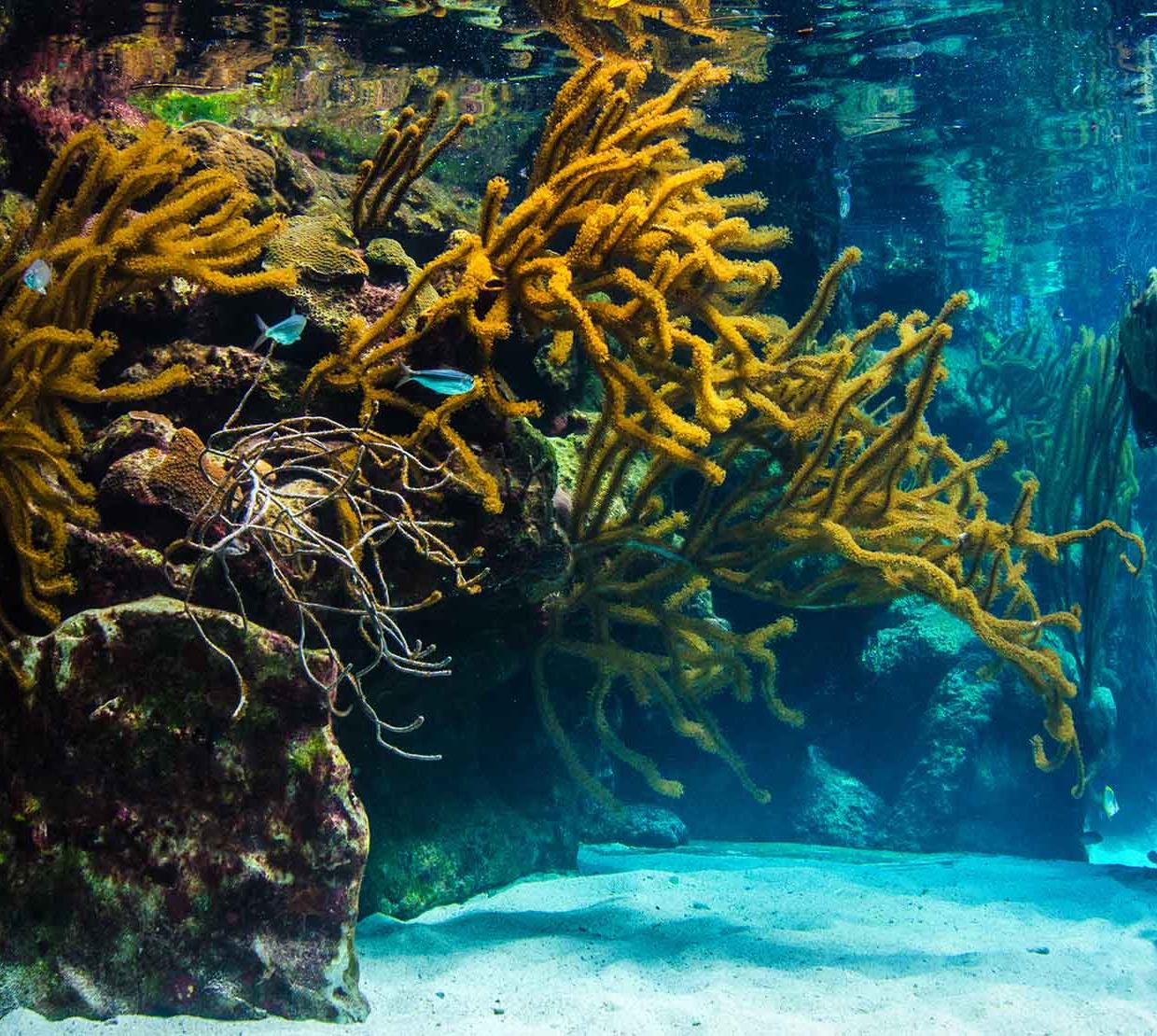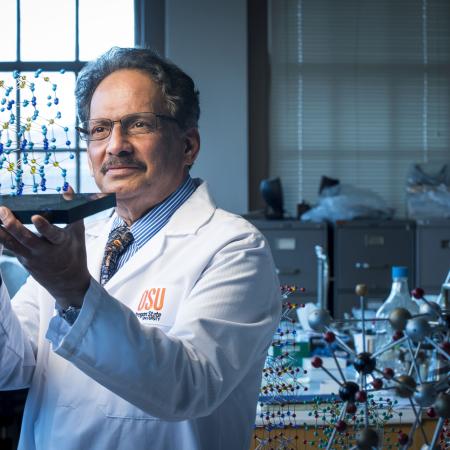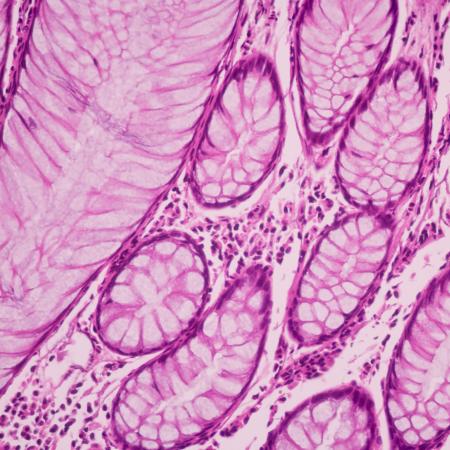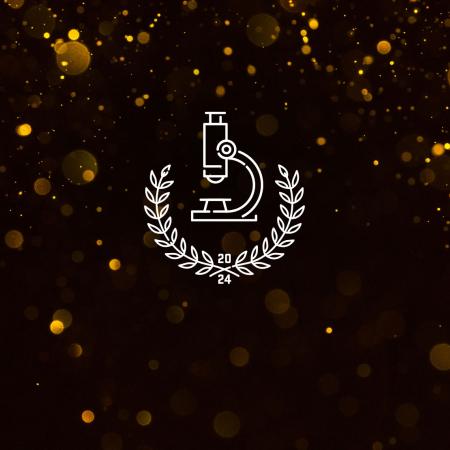The College of Science’s efforts to advance engagement with science at all levels have been steadily gaining momentum thanks to the incredible contributions of our faculty and students. As a College, we continue to show that science does not have to be confined to an ivory tower, but can and must be used to inform the public about the complexities of life and the world we live in.
Several of this year’s notable accomplishments have been in global research and national and international recognition of our faculty and students.
The research our faculty and students are engaged in demonstrates their passion for the environment, sustainability, oceans, human health, and the data that underlie and illuminate those areas. Our faculty and students are committed to improving the world around us by making it better than how we found it. The year was marked by groundbreaking research on ocean acidification, earthquake forecasting, the dangers affecting coral reefs and more.
Our scientists made key research advances in curing disease from the discovery of a bacterium that kills melanoma cells to successfully combating drug resistance in certain infections. Science faculty and students have won national and international awards and recognition for their extraordinary achievements in improving undergraduate education and innovative research. We look forward to building on this trajectory of growth and momentum this year and beyond.
Highlights of 2017-18
Awards and leadership
- Mathematician Elise Lockwood receives MAA Award for Research in Undergraduate Mathematics Education.
- Great story of how a Japanese musician recreated Mas Subramanian’s YInMn blue to help the children of Fukushima still battling the devastating nuclear powerplant meltdown in 2011.
- A graduate student determines that size is the main factor in predicting how calcifying organisms will respond to ocean acidification.
- Chemistry professor named a 2018 Fellow by the American Chemical Society.
- We hosted 22 area high-school students interested in STEM at Juntos Chemistry Camp in June where they enjoyed liquid nitrogen ice cream and the chemistry behind it through hands-on lab work.
- Biophysicist Weihong Qiu solved a longstanding puzzle concerning the design of molecular motors, paving the way toward new cancer therapies.
- Team Math, including a group of mathematics instructors, received the 2018 Faculty Senate Student Learning and Teamwork Award for creating and sustaining an exemplary learning environment in mathematics courses.
- A 2018 math graduate landed job offers by two Major League Baseball teams—Texas Rangers and New York Yankees, thanks to his expertise in baseball analytics.
- Two Ph.D. students received prestigious NSF Graduate Research Fellowship Program awards for 2018 for 2018.
- Two of seven students at OSU to win Fulbright Scholarships in 2018 were science students!
- Statistics Professor Javier Rojo received the 2018 Dr. Etta Falconer Award for Mentoring and Commitment to Diversity.
- Two math and biology professors were named 2018 OSU Advance Faculty Fellows to advance diversity and equity in STEM fields.
- Physics department head Heidi Schellman was selected to lead a commission of the International Union for Pure and Applied Physics.
- Professor of Physics Janet Tate was named a Distinguished Professor at OSU, bringing our total to 20, more than any other college.
- Distinguished professor of marine ecology Jane Lubchenco received the prestigious National Science 2018 Vannevar Bush Award for her exceptional lifelong leadership in science and technology and substantial contributions through public service in science, technology and public policy.
- Mathematics Professor Juan Restrepo was one of the 28 researchers chosen from around the globe as a 2018 Fellow for the Society of Industrial and Applied Mathematics (SIAM) for his outstanding research and service for the community.
- Biology professor Sally Hacker was elected an AAAS Fellow for her distinguished contributions to coastal ecology.
- Delaney Smith, a junior biochemistry and biophysics major, received the Barry Goldwater Scholarship for 2018, the top undergraduate award in the country for sophomores and juniors in STEM. She was the only Goldwater Scholar selected from an Oregon institution this year.
Teaching and innovation
- We were one of three universities to receive a national award from the American Physical Society for improving undergraduate physics education in 2018.
- Science faculty awarded prestigious $1M HHMI grant to develop culturally inclusive pedagogies in STEM programs.
- Mathematics faculty replaced the traditional classroom model to improve student success in introductory algebra courses by integrating technology, new active learning approaches and measurement of student performance and understanding. These have improved retention, performance and student engagement in 100- and 200-level mathematics classes at OSU.
- In partnership with Ecampus, biology faculty helped create a groundbreaking, first-of-its kind 3-D Virtual Microscope and online introductory biology course series, winning a 2017 WCET Outstanding Work (WOW) award for technology-based solutions that transformed the college learning experience.
Student Success
- We graduated 5% more science students than 2017!
- We launched an Integrated Professional Development platform featuring innovative career preparation programs with content delivered in first-year experience science courses that help to build students’ professional skills and give them a competitive edge in the job market or in graduate school.
- A biohealth sciences major founded OSU’s first pre-osteopathic student club that earned national recognition as Chapter of the Year, from the parent organization Student Osteopathic Medical association, in its first year of operation.
Research
- Statistics research showing how better short-term earthquake forecasting and risk assessment is possible.
- Our statisticians led by Yuan Jiang received a grant to innovate statistical methods to study the human microbiome and its role in human health.
- The Department of Mathematics received its first ever NIH grant—a $437K award from the National Center for Advancing Translational Sciences to build a Biomedical Translator, which is a software system that connects distributed databases of biomedical knowledge and has the capability to “reason” over these data sources to answer relevant biomedical questions.
- A mathematics professor used statistical models to show how the concept of uncertainty in climate science is often misrepresented in public and political discussions.
- Mathematics research by David Koslicki recently showed that the blood of schizophrenia patients features genetic material from more types of microorganisms than that of people without the debilitating mental illness.
- Astrophysicist Davide Lazzati proved that short gamma-ray bursts do follow binary neutron star mergers, confirming that last fall’s union of two neutron stars caused a short gamma-ray burst.
- Our microbiologists advanced the fight against drug resistance, crafting a compound that genetically neutralizes a pathogen’s ability to thwart antibiotics.
- Chemistry professor Sandra Loesgen and graduate students identified a type of soil-dwelling bacterium that produces molecules that induce death in melanoma cells.
- The Department of Integrative Biology hosted the 9th International Symbiosis Society Congress this summer which attracted 400 scientists from around the world to OSU.
- Our microbiology department received a $404K grant renewal to continue to support graduate students studying fish health thanks to the Oregon Department of Fish and Wildlife (ODFW). The 13-year fruitful collaboration benefits fish health and sustainable economic growth in Oregon as well as produces graduates that are now setting policies to ensure a healthy resource well into the future.
- Biology professors are part of an international research group that found that for reef-building corals, not just any symbiotic algae. Their research shows the dangers faced by coral reefs due to the breakdown in the symbiosis relationship, another danger sign for the world’s coral reefs.
- Our chemists led by May Nyman are part of a five-year, $12.5 million National Nuclear Security Administration grant to study nuclear stewardship.
- Biochemists found that loading nanofiber sutures with vitamin D induces the production of an infection-fighting peptide.




